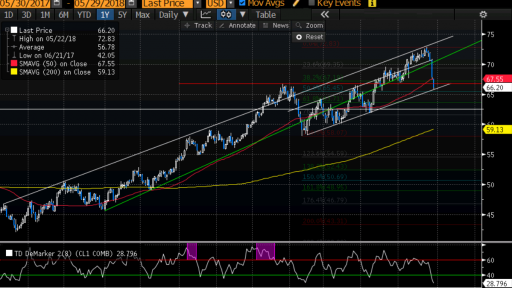- Home
- >
- Commodities Daily Forecasts
- >
- Fundamental analysis of oil and how its price will affect the markets

Fundamental analysis of oil and how its price will affect the markets

The price of oil has really suffered a serious blow, and it is undoubtedly the result of the actions of two countries - Russia and Saudi Arabia. Only a week ago, the two sides were the largest advocates of OPEC's abridged production agreement and non-cartel countries. Currently, however, the policies of both countries have sharply changed the direction, surprising everyone, from the OPEC producers to the traders on the floor in Chicago.
Why did Russia and OPEC take these actions? Supply threats stemming from the re-imposition of US sanctions on Iran and the collapse of the energy industry in Venezuela have led the Arabs to take cardinal measures and show that they are still a factor in the market. Although unofficially, oil speculators believe Donald Trump is also part of Saudi Arabia's decision. On April 20, the US president said he was worried about rising oil prices, blaming OPEC for being at the bottom of everything by exporting a large amount of oil to tankers in the ocean, waiting for the price to jump.
The nuclear agreement with Iran - The fact is that the United States has distanced themselves from the nuclear agreement with Iran, which somewhat guaranteed security in the Middle East and oil sales of the country. Immediately thereafter, the European Union took things in its own right, pledging Iran to buy some of its oil, and in return for the country not to develop a nuclear weapon. Not everything, however, is as easy as the European Commission's proposal faces serious concerns. In particular, worries triggered the proposal to finance deals with Iran with the help of the European Central Bank. Central banks are concerned not to be accused of cooperating in money laundering and terrorist financing. For example, Iranian currency transfers in euro can later be transferred to Hezbollah, which is considered a terrorist organization by the United States. The European Commission said it could finance oil dealings with Iran without the intervention of commercial banks with the help of central banks. They could transfer to the Iranian central bank sums in euros to repay European oil consumption. In this way, US sanctions could be circumvented, and this would allow Europeans to continue to carry out oil deals with Iran. This, in turn, would help to meet the economic commitments made when the nuclear agreement was signed.
What can we expect from now on? Really, the market is still confused and the traders play it safe because it is not clear what the OPEC countries reaction will be. As Saudi Arabia was the leader who gave the strongest support to the cut agreement, such a policy change would most likely give impetus to smaller oil producers to increase yields. I believe that this will drive the price of black gold from now on, as most of these countries are experiencing enormous financial difficulties. I also add to the bearish outlook the large accumulation of stocks in the US and the fact that the speculative net positions are at a zero level, indicating that they do not expect further rallies in the upward direction.
Do not forget the US too! ! ! In the past year, the US has become one of the world's largest oil producers, ranging directly behind Saudi Arabia. This undoubtedly made the country a factor in the oil market. The US has achieved this mainly through the shale deposits, which have been developing very hard in the last 5 years. Big investments in shale deposits and, in general, in the extraction technology itself have contributed to a drastic reduction in the cost-effective cost at which they become effective - Between $ 46 and $ 50. What does this mean? It means that Break Even Point is well below the current market price of $ 67, and this will allow Americans to get even the price to continue to collapse. In other words, as long as the price does not fall below $ 50, the US will in no way react to the fact that OPEC and Russia are shifting the direction of abridging yield to its increase. Statistics show it best ... Crude oil production in the US has not shown signs of losing weight. US energy companies have added 15 more working drilling platforms in the week ending 25 May, bringing them to 859 - the highest level since 2015. This is an indicator that crude oil production in the US will continue to grow.
Crude oil production in the US has already risen by more than 27% over the past two years to 10.73 million barrels per day, moving closer to the level that Russia is producing - 11 million barrels per day.
What will happen if oil prices continue to collapse? The most losing ones will be the energy companies. Taking into account the fact that they are the most burdened on the world's major stock indices, it is very likely that we will see a decline in the global equity market. From there, investors will be forced to target the purchase of Safe Haven tools such as Gold, JPY, CHF and inverse ETFs. Let's not forget the FX market, where the oil fall will be felt most strongly in the Russian ruble and the currencies from the developing markets will be down mainly because of the risk appetite and the sell-offs on the stock market.
 Trader Aleksandar Kumanov
Trader Aleksandar Kumanov Read more:
If you think, we can improve that section,
please comment. Your oppinion is imortant for us.











